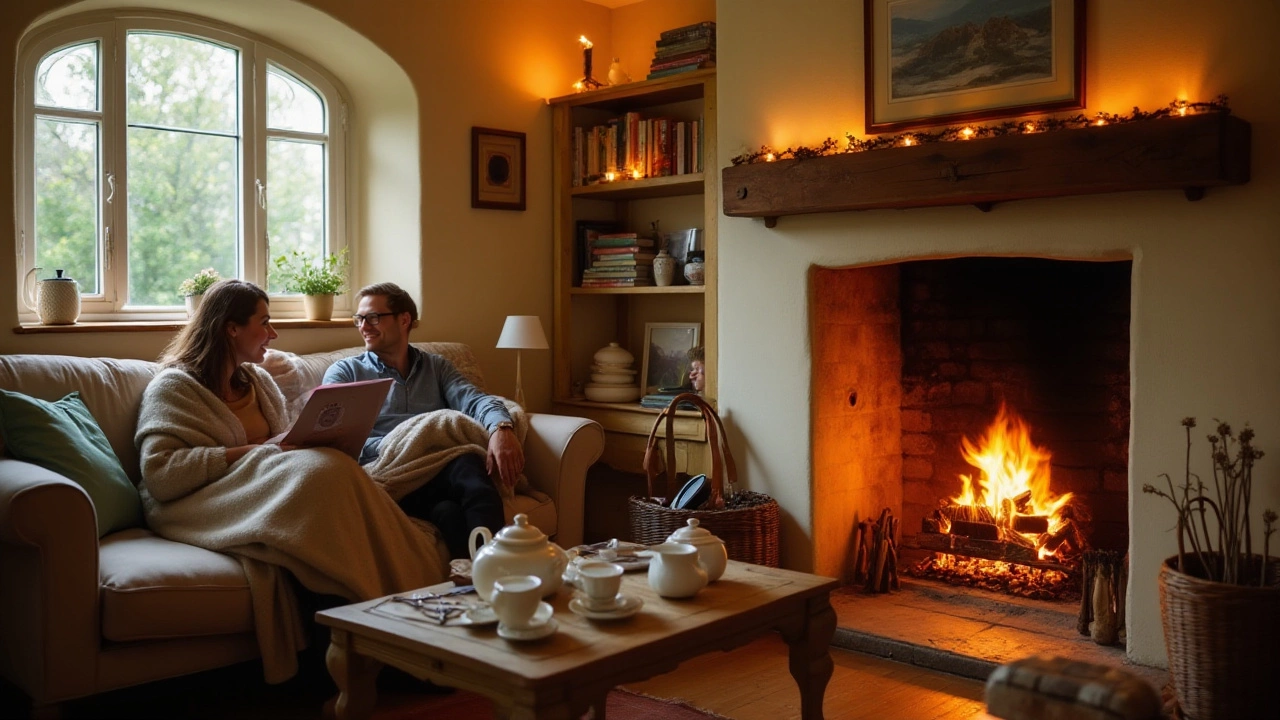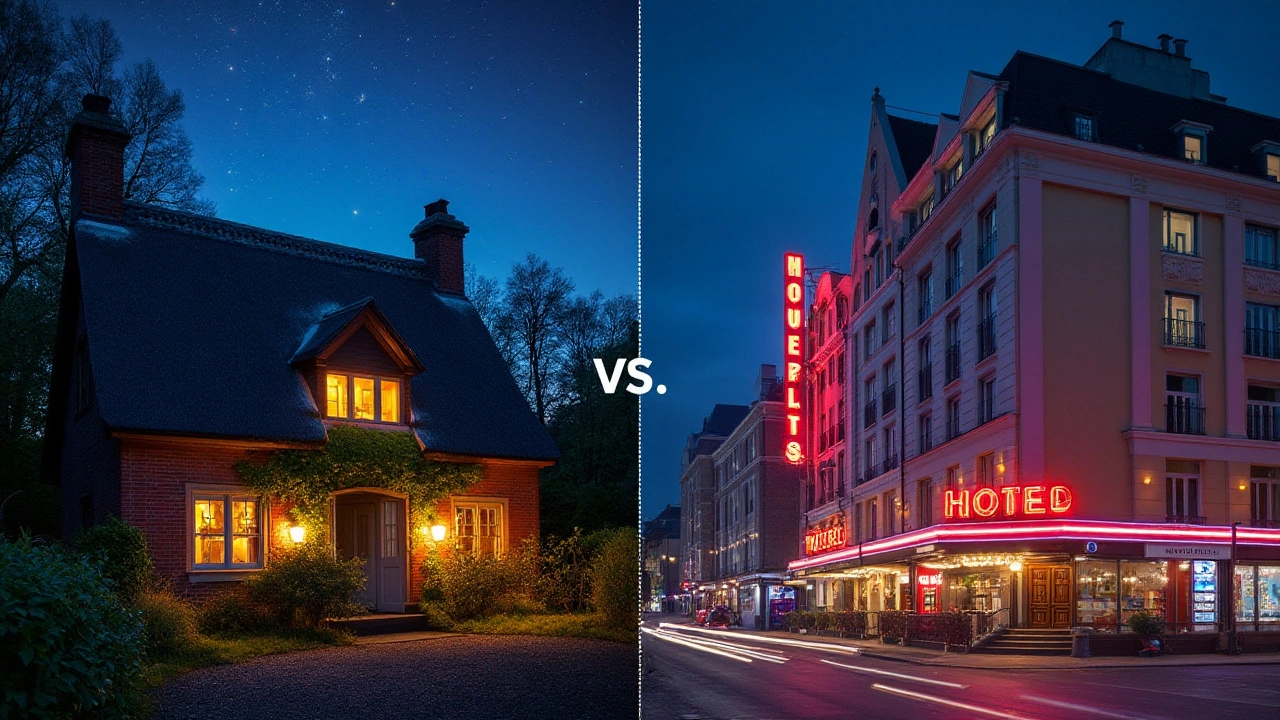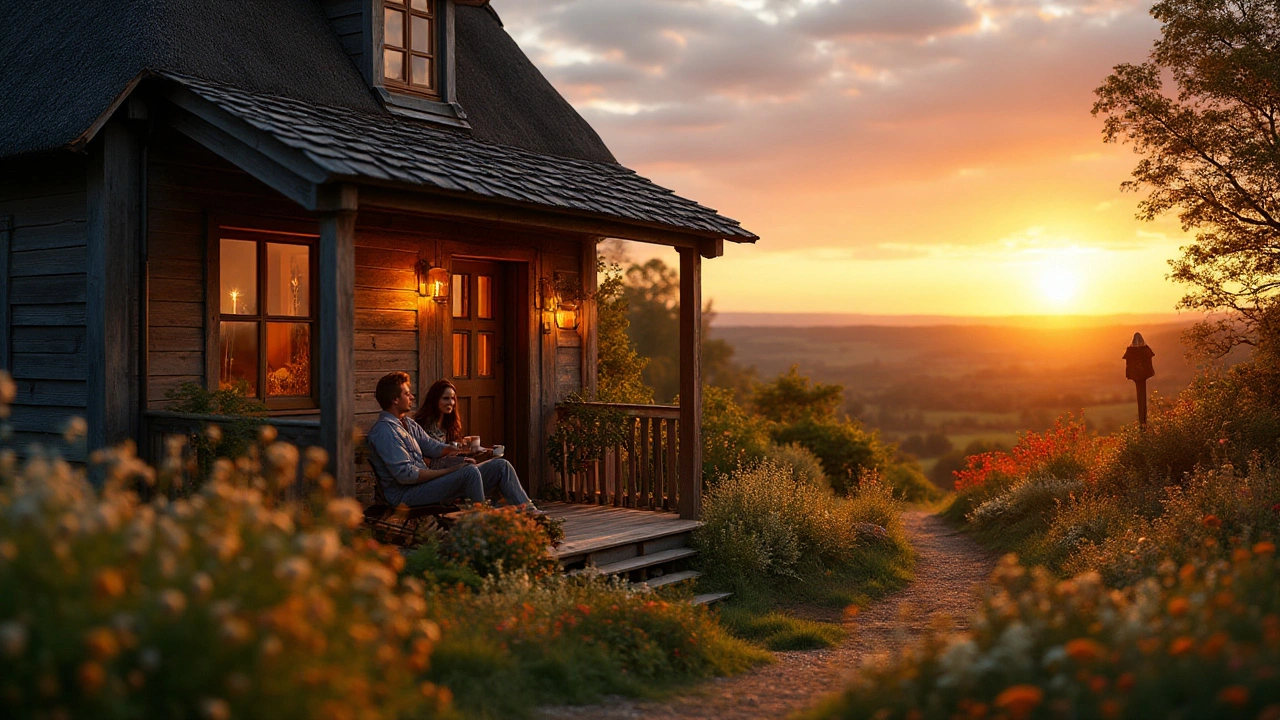Exploring the Cost-Effectiveness of Romantic Cottages vs Hotels
9 Dec, 2024The charm of retreating to a quaint cabin in the woods has captivated many couples seeking a romantic getaway. But is this experience also lighter on the wallet compared to staying in a hotel? Understanding the cost differences between these options requires a curious look beyond just the surface price tags.
Cabins often evoke a sense of seclusion and connectedness with nature, while hotels deliver convenience and modern amenities. Each choice comes with its own set of financial implications, and what might appear initially expensive might unfold as having hidden savings. Let's explore if these rustic hideaways are truly a cheaper alternative, while laden with charm and romance.
- The Allure of Romantic Cottages
- Cost Breakdown: Cabins vs Hotels
- Hidden Costs and Savings
- Seasonal Pricing and Deals
- Value Beyond the Price Tag
- Tips for Finding Affordable Cabins
The Allure of Romantic Cottages
There's something undeniably seductive about the idea of escaping to a ruggedly charming cabin, hidden away from the hustle and bustle of modern life. When it comes to encapsulating the essence of romance, cottages boast a unique ability to transport couples into a world that feels entirely their own. This sensibility is rooted not just in the idyllic settings they often inhabit, but also in the very design and ethos of these quaint spaces. As you enter a cabin, it feels like stepping into a cocoon of comfort where time slows down and nature's symphony becomes the background score. The rustic appeal, characterized by wooden interiors, stone fireplaces, and panoramic views, speaks to those in search of authenticity and intimacy.
Unlike hotels, where interactions are mostly transactional and spaces can feel impersonal, romantic cottages offer an atmosphere that encourages relaxation and connection. There's a profound sense of history and character embedded in these dwellings that modern accommodations struggle to replicate. The embrace of a well-loved armchair by the fire or cooking together in a kitchen with a view of whispering pines can transform a simple weekend into a cherished memory. This sentiment is echoed by many seasoned travelers. As travel writer Linda Coyle once observed,
"Staying in a cabin is like returning to a much-loved book—there's comfort in the familiarity but always new tales to discover."Such experiences create the kind of intimacy that many couples crave when seeking a temporary escape.
Beyond the aesthetic, staying in a romantic cottage often brings with it a host of experiential advantages that hotels rarely match. Picture this: waking up to the call of loons on the lake, enjoying your morning coffee on a private deck wrapped in an embrace of treetops, or hiking directly from your doorstep into untouched wilderness. These are moments, made largely possible by the locations these cabins are nestled in, that add immeasurable value to any retreat. Because cottages frequently lie off the beaten path, they provide not only a refuge from the ordinary but also closer proximity to nature's untouched beauty—a facet that couples inclined toward exploration and adventure find incredibly appealing.
Cost Breakdown: Cabins vs Hotels
When comparing the expenses of staying in a romantic cabin to that of a hotel, several factors need to be considered. At first glance, hotel stays may appear more expensive, primarily due to their location in urban centers or tourist hotspots. Cabins, often tucked away in more secluded settings, can initially seem cost-effective due to cheaper nightly rates. However, these rate differences can obscure true costs when you begin to factor in aspects like amenities, location, duration of stay, and additional expenses such as food.
One notable cost-saving element with cabins is the opportunity to cook your meals courtesy of the kitchenette or full kitchen that many offer. This amenity can significantly lower your food budget compared to eating out at restaurants, which is a usual occurrence during hotel stays. A simple grocery shopping trip can cover several meals, reducing the daily meal expenditure significantly. Conversely, many hotels offer complimentary breakfast or meal coupons, which can balance this advantage to some extent but rarely cover all meals.
Moreover, the location of many cabins comes with both pros and cons. While being away from city noise and chaos is a definite plus, it sometimes means spending more on transportation, especially if you plan to explore nearby areas. This contrasts with a hotel, where public transport might be readily available, or attractions could be within walking distance.
"The beauty of choosing a cabin lies in its holistic value rather than merely focusing on dollars," says Dr. James E. Simmons, a renowned travel economist. "Sometimes, a sense of peace itself can outweigh the monetary savings one gets with on-site amenities."
Another key point is seasonal pricing. Cabins often hike their rates during peak travel seasons, particularly in locales known for winter sports or summer lodgings by lakeside. Timing your stay outside these periods could result in significant savings. In contrast, hotels usually have a more stable pricing pattern, although they may become pricier near major events or holidays.
Occasionally, when examining the price details, additional factors like cleaning fees, taxes, or service charges can come into play. Cabins, particularly those available on short-term rental platforms, often attach these fees, which can add up quickly. Hotels might include these in their published rates or charge them separately, but they tend to be more transparent about total costs up front.
Ultimately, whether you decide to stay in a hotel or a cabin, understanding these financial nuances helps maximize value and informs a decision that best meets your needs for comfort, convenience, and unforgettable experiences.

Hidden Costs and Savings
Delving into the world of cabins versus hotels uncovers an intriguing spectrum of hidden costs and unexpected savings. These aspects often tilt the economic balance in favor of one over the other. Initially, cabins may seem to carry a hefty upfront charge, particularly luxurious ones nestled in scenic settings. However, this isn't the whole story. Many of these cabins come equipped with full kitchens, allowing guests to prepare their meals. This can significantly cut down the food expenses that often balloon when staying at a hotel where dining out is frequent. Furthermore, cabins frequently waive some of the charges that hotels add, such as parking fees or resort fees, which can stealthily accumulate over the duration of a stay at a hotel.
Similarly, it's vital to evaluate other non-monetary savings. Cabins located in serene, secluded environments naturally foster a more laid-back atmosphere. This tranquility can translate into savings on entertainment and recreational activities that typically require additional funds in urban hotel settings. While hotels often entice visitors with sprawling urban landscapes and proximity to bustling activity hubs, this often prompts guests to spend more on nightlife excursions and city tours. In contrast, cabins offer the simplicity of enjoying nature, like hiking trails and lakeside picnics, which can lessen recreational spending substantially.
Moreover, the varying seasonal pricing of cabins opens avenues for cost-efficiency. For instance, off-peak seasons tend to present much lower nightly rates, whereas hotels, particularly in cosmopolitan heartlands, tend to have only slight variations. During shoulder seasons, the beauty of nature remains accessible without the tourist spikes, providing a premium experience at a better rate. This can particularly benefit individuals who have flexible travel timelines, taking advantage of discounts without compromising on the immersion experience. Additionally, unlike hotels, where early booking discounts are uncommon, many cabin owners incentivize travelers with substantial price cuts for early reservations or longer stays.
It's also worth mentioning that some cabins incorporate enticing offers in their pricing models, such as free local experiences or guided nature tours, that inherently represent an added value. This might not be apparent in the catalog price, yet it enhances the overall experience at no extra expense, unlike hotels that may charge for concierge services or premium guest experiences. Always inquire about what's included as part of the package to fully appreciate the value proposition of cabin stays.
A travel enthusiast once explained, "The art of traveling economically isn’t just about cutting corners; it’s about exploring and discovering value in unique ways," a philosophy that underlines the nuanced savings hidden within cabin stays.
Seasonal Pricing and Deals
When it comes to budget-friendly getaways, understanding the nuances of seasonal pricing for cabins and hotels can be a game-changer for your travel budget. Cabins in serene locations often see fluctuations in price based on the time of year, largely due to demand. During peak seasons such as summer and the holiday months, prices may surge as travelers flock to experience the picturesque beauty and tranquility these romantic cottages offer. However, savvy travelers can find significant deals during off-peak periods, where the dip in visitor numbers encourages hosts to drop prices, making stays surprisingly affordable.
One fascinating aspect of off-peak travel is the unique opportunity to enjoy the same stunning environments with far fewer tourists, which not only enhances the secluded experience but often comes at a fraction of the cost. Many cottage owners offer special packages or discounts during these quieter months to entice visitors. Strategies like mid-week stays or longer bookings can also yield substantial savings. In fact, a study by a travel aggregator uncovered that off-season stays can be up to 50% cheaper, a remarkable incentive for those flexible with their travel dates. It's not unusual to find cabin rentals offering added perks during these times, such as complimentary upgrades or additional amenities like welcome baskets filled with local treats.
Seizing Special Offers
To capitalize on these fluctuations, it's essential to pay attention to promotional offers and seasonal deals. Many rental platforms and website resources regularly list promotional codes or flash sales that can further slash costs. Subscribing to newsletters from travel sites or cabin rental services can keep you informed on the latest deals, ensuring you never miss an opportunity to save. A quote from Condé Nast Traveler captures this perfectly:
"Timing is everything when booking your countryside escape; with a keen eye on the calendar, desired cabins can transform from aspirational to attainable with the right deal."Such insights stress the importance of planning and flexibility, allowing romantics and adventurers alike to maximize their travel budgets without sacrificing the quality of their stay.

Value Beyond the Price Tag
When choosing between the intimate warmth of cabins and the standardized comfort of hotels, the evaluation extends far beyond mere price tags. Sure, staying in a hotel can sometimes seem like the cost-effective choice due to bundled amenities. However, the value of a romantic cottage experience often transcends purely financial considerations in several engaging and meaningful ways.
Firstly, there's the unparalleled privacy that a cabin provides, a luxury in itself. Unlike hotels, where walls are shared and city sounds seep through windows, cabins offer secluded spaces where nature's soundtrack is the only playlist. This element alone has been lauded by couples as bringing a unique sense of tranquility and intimacy that can't be matched. According to a study by the Cornell School of Hotel Administration, "Travelers increasingly seek personalized, authentic experiences, with millennials leading the race in cabin bookings due to the sense of exclusivity and adventure they provide."
A study in the Journal of Tourism Research found that couples value seclusion and natural settings, which significantly enhances the perception of a romantic getaway.
Moreover, cabins often offer direct access to stunning natural landscapes, which many seek out not just for the serene views but as a therapeutic escape from daily stressors. This opportunity to be immersed in nature can often lead to outdoor activities that create lasting memories beyond the price tag of the accommodation—an evening under the stars or a morning hike has intrinsic value that corporate hotel chains can't replicate. In many locations, staying in a cabin opens up access to pristine hiking trails or private fishing spots that turn the trip into an adventure, not just a stay.
Also, the chance to cook your meals in a well-equipped kitchen that's usually part of the cabin experience is a practical yet significant value addition for many. Not only does it cut down on dining out expenses, it also allows for tailor-made meals which accommodate dietary preferences and enhance bonding through shared cooking experiences. For families or groups desiring space to spread out, cooking together in a cozy kitchen can become a delightful part of the vacation narrative.
The unique charm of a cabin can even extend into its ability to be a host for special events or personal celebrations. Birthdays, anniversaries, or quiet personal milestones gain a distinctive memory when set against the backdrop of a cabin in the woods. Whether it's the glowing embers of an outdoor fire pit or the inviting embrace of a rustic wood fireplace inside, the setting plays a key role in etching these events into fond memory.
Finally, renting a cabin often contributes to local economies in a more immediate and impactful way than staying in a multinational hotel chain. Many cabins are owned by local families or small businesses that funnel proceeds back into the community. In various studies, economists highlight this as a significant value advantage from an ethical consumption standpoint, as it promotes sustainable tourism. Statistics show that regions with thriving cabin rental markets like Muskoka in Ontario see a strong secondary economic boost from increased cabin-based tourism.
Tips for Finding Affordable Cabins
Finding an affordable cabin for that perfect romantic cottage escape doesn't have to be a daunting task. With a little creativity and some informed decision-making, you can unearth an array of options that won’t break the bank. One initial step is embracing the power of timing. Traveling during off-peak seasons when demand is lower can lead to significant discounts. Many cabin rentals offer reduced rates during month-long periods that don’t coincide with holidays or summer vacations. This means planning your trip for late spring or early autumn could see you enjoying all the rustic joys of cabin life at a fraction of the cost.
Ditch the big-name travel sites for more specialized platforms. Sites focusing on cabin and even cottages can provide exclusive deals that aren’t available elsewhere. Websites like VRBO or Airbnb often list lesser-known locales that are equally charming but more affordable. Setting an alert for price drops or new listings can also work to your advantage, as some owners may adjust rates to fill last-minute vacancies. You'd be surprised at the gems you can find with a recurring search in the right places.
Take advantage of loyalty programs or memberships. Certain organizations like AAA, travel clubs, or credit card points can be more beneficial than you think when applied to cabin stays; inquire whether such deals apply to your booking. It's worth checking with any associations you belong to, as some lesser-known programs offer surprising perks. Rewarding loyalty with discounts or rural-specific benefits is common practice. And let’s not forget the classic method of negotiating directly with the cabin owner. If a cabin is less booked during your desired dates, there is often room for rate negotiation. After all, direct communication can sometimes yield unadvertised discounts.
“The best deals are those you can negotiate yourself. Don’t be afraid to ask for a better rate — sometimes it’s as easy as that.” — Travel Expert Jane Smith.
Consider broadening your search geographically to include areas just outside major tourist destinations. These spots can hold the same natural beauty without the premium price tag associated with popular regions. Look for lesser-known national parks or forest areas offering cabin rentals; they often provide a unique experience with fewer crowds, adding not only to affordability but also to the serenity of your spartan getaway.
Finally, embrace technology to aid your search. Apps and plugins in your browser can scour web pages to find coupon codes or comparative rates, making sure you get notified when prices drop to your desired range. Using multiple tools gives you the edge needed when pursuing affordable accommodations. It's about making the internet work for you, directing its full potential towards your cabin search.

 by
by